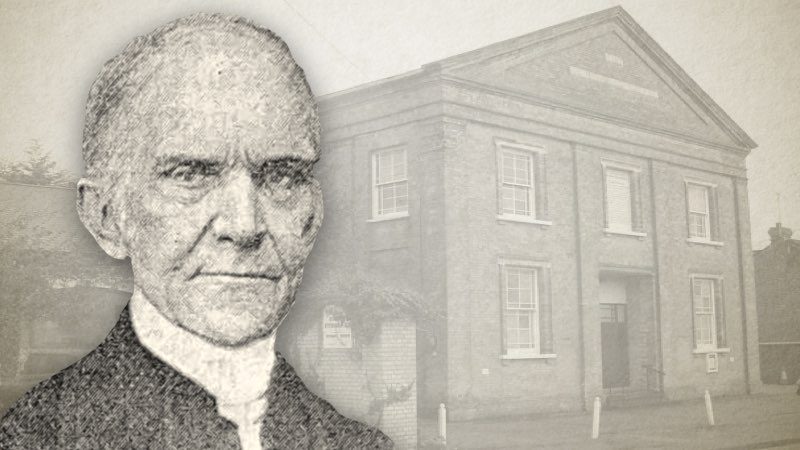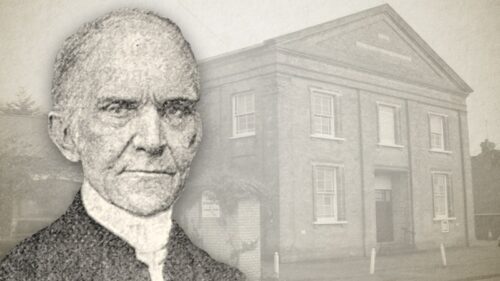-
A Specimen Of Hercules Collins’ Teachings
The Reformed Baptists are under the impression they represent the teachings of the 17th century Particular Baptists (17th PB’s). They believe the 17th PB’s were Moderate-Calvinists. During the 18th century, there arose a new generation of preachers who deviated from their forefathers, running to the extremes of Hyper-Calvinism. These hyper teachings killed evangelism which in turn suffocated the churches. To the rescue came Andrew Fuller, who in the latter part of the century restored the Particular Baptists to their former glory. Evangelism was reintroduced and churches could breathe again. As you might expect, the Hyper-Calvinists believe this to be a false narrative. However, you probably have seldom, if ever, heard their side of the story. I will present it from my perspective (as a Hyper-Calvinist).
-
Moody And Sankey’s Errors, Versus, The Scriptures Of Truth
Before James Popham was appointed pastor of Galeed Chapel, Brighton (1882), he served seven years as pastor of the church meeting at Shaw Street Chapel, Liverpool. It was at that time he published a pamphlet entitled, “Moody And Sankey’s Errors, Versus, The Scriptures Of Truth.” Dwight L. Moody (1837-1899) was an American Congregational evangelist. Ira D. Sankey (1840-1908) was an American Methodist hymn-writer and soloist. Between the years 1873-1875, these men traveled around the United Kingdom, hosting “evangelistic campaigns”. Sankey attracted the crowds with his singing; Moody “closed the deal” with his “gospel sales pitch”. They held 285 meetings in London alone, with an estimated attendance of two-and-a -half million people. Their message was that of free will works religion, couched in the language of…
-
The Duty Of A Gospel Preacher
On December 13, 1875, St. John’s Green Chapel, Colchester, held special services for the induction of their new pastor, Mr. Brown. Several local pastors formed the ordination council, among which was Mr. John Bunyan McCure. He was appointed to bring the “charge” to Mr. Brown, in preparation for his pastoral duties at the chapel. “I speak a word of exhortation for your patience. Here are we with Mr. Brown just recognized; and it is now my duty to deliver the charge with only a few minutes to do so. In days gone by there was plenty of time allowed for this, but we are living in days when we have to do everything in a hurry; coming to my subject—Mr dear Brother, I speak to…
-
Notes On “Fullerism”
A main error of Mr. Fuller—and perhaps it was that in which his system, and the arguments by which he defended it, originated—consisted in the excessive and anti-scriptural ideas he formed of the accountableness of man. He attached obligations to him as a free agent, which, in fact, never devolved upon him by any law of his Creator, and invested him with a responsibility for talents which he never possessed. Because man is naturally obliged as a creature to love and obey God, according to the extensive purity and requirements of the Divine law, be maintained that the same reason in which his natural obligation as a creature was founded obliged him also, as a sinner, to believe in the Lord Jesus Christ for salvation…
-
A Declaration Of Faith
The church of God should continually "contend for the faith which was once delivered unto the saints.” (Jude 3), and in these darkening and disastrous days, our testimony should not be like muffled bells, but clear and distinct. "The children of Ephraim, being armed, and carrying bows, turned back in the day of battle" (Ps 78:9). Was it cowardice, or expediency, or a fatal love of ease? We cannot but remember the words, "Help, LORD; for the godly man ceaseth; for the faithful fail from among the children of men" (Ps12:1). "Faithful," that is, men of truth; "Amen men," as Luther called them. Openness, as opposed to reticency, straightforwardness, thoroughness and steadfastness are qualities absolutely needed now; courage is required to call things by their…
-
Thoughts On Responsibility
It appears to me that on no subject are the religious professors of the present day more confused, yea, in the dark, than that of man’s responsibility, and often have I wished that some gifted servant of the Lord would take pen in hand and give a few thought on this important subject. The attempt made by the Rev letter-learned moderate Calvinists of the day, to reconcile God’s sovereignty and man’s responsibility, viz, in the matter of salvation, is like searching for the philosophers stone, although a fruitless attempt to discover what, according to their view of the subject, has no existence; or to make two directly opposites meet together. In this, as in all other parts of the jumbled creed, the grand error evidently…









